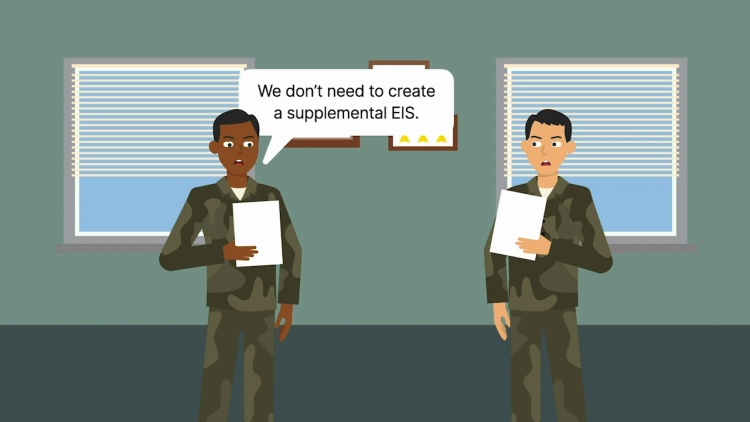Marsh v. Oregon Natural Resources Council
United States Supreme Court
490 U.S. 360, 109 S.Ct. 1851, 104 L.Ed.2d 377 (1989)
- Written by Craig Conway, LLM
Facts
The Oregon Natural Resources Council and three other non-profit environmental interest groups (plaintiffs) filed suit in federal district court against John Marsh, in his official capacity as Secretary of the Army and head of the U.S. Army Corps of Engineers (Corps) (defendant) to enjoin construction of the Elk Creek Dam, the last dam to be built as part of a three-dam project in Oregon’s Rogue River Basin. In 1971, the Corps prepared an Environmental Impact Statement (EIS) covering the three-dam project as required by the National Environmental Policy Act of 1969 (NEPA). The Corps issued a “Final Environmental Impact Statement Supplement No. 1” (FEISS) in 1980 and proceeded with construction of the dam in 1982 despite two memoranda released by the Oregon Department of Fish and Wildlife and the U.S. Soil Conservation Service indicating the project would have greater adverse impacts on the environment than previously believed. Plaintiffs argued that the Corps violated NEPA by failing to prepare a second supplemental EIS in response to the information contained in the two memoranda. The district court disagreed and held that a second supplemental EIS was not required. Plaintiffs appealed. The court of appeals reversed and held that the Corps had not adequately addressed the information provided in the two memoranda. The U.S. Supreme Court granted certiorari to review.
Rule of Law
Issue
Holding and Reasoning (Stevens, J.)
What to do next…
Here's why 907,000 law students have relied on our case briefs:
- Written by law professors and practitioners, not other law students. 47,100 briefs, keyed to 996 casebooks. Top-notch customer support.
- The right amount of information, includes the facts, issues, rule of law, holding and reasoning, and any concurrences and dissents.
- Access in your classes, works on your mobile and tablet. Massive library of related video lessons and high quality multiple-choice questions.
- Easy to use, uniform format for every case brief. Written in plain English, not in legalese. Our briefs summarize and simplify; they don’t just repeat the court’s language.





